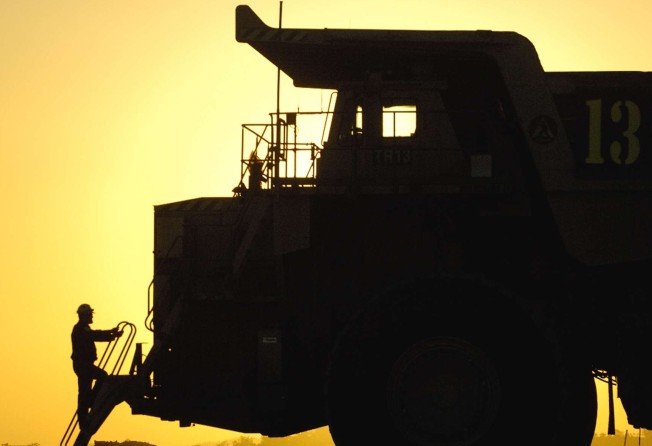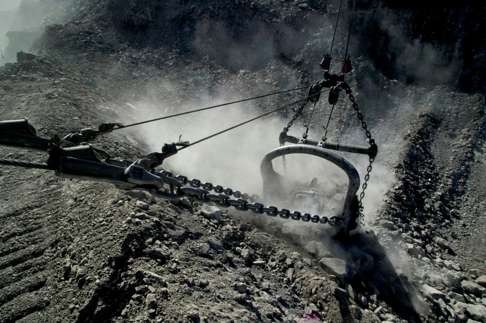Chinese firms back on the hunt for mining treasure as majors offload assets
Study shows domestic firms snap up US$4.49b worth of overseas mining interests in the first six months, an 18.2pc rise

Resurgent Chinese interest in overseas mining acquisitions is expected to remain strong, amid expectations that metal prices may be bottoming out and as international mining majors look to improve their portfolios by selling assets.
Domestic firms snapped up US$4.49 billion worth of overseas mining assets in the first six months of the year, an 18.2 per cent rise on the US$3.8 billion in the same period last year, according to data collated by Mergermarket which has co-published a report on the findings with international law firm Baker & McKenzie.
“In the past, China’s demand [for overseas assets] has been driven by central [government] policy, [but now] we are seeing more opportunistic buying,” said John Mollard, global head of mining at Baker & McKenzie.
“The [rising deal flow] perhaps reflects a view that commodity prices are near the bottom [of their cycle], and the fact that many international majors have been adjusting their asset portfolios [amid the downturn] so that better assets are becoming available.”
The law firm has advised Chinese firms in their outbound acquisition deals and earned fees from such work.
Mollard expects this year’s total deal value to at least match last year’s, after what had been an annual downtrend since 2011.
Deal volumes are being influenced, primarily, by whether Australian coal mines — put on the block by mining giants such as Anglo American, Rio Tinto and Peabody — are sold and if the rising interest in “high-tech” minerals like lithium and graphite, used in advanced batteries, is maintained.
During the first half, China Molybdenum, controlled by mainland businessman Yu Yong but also substantially owned by the Luoyang municipal government, stood out as the biggest overseas asset buyer.
Its US$1.5 billion acquisition of Anglo American and Ambras’ niobium and phosphates businesses in Brazil and the US$2.65 billion purchase of a 56 per cent stake in Congo-based copper and cobalt miner Tenke Fungurume Mining, took the lion’s share of the deal flow.
Mollard noted overseas Chinese acquisitions are no longer dominated by large state-owned firms, with more private and provincial state-backed firms joining the hunt for secure supplies of raw materials or in making a business diversification.
Guangdong Rising Assets Management, a provincial government-owned metals-to-property projects investor, a year ago bought all the shares it did not already own in Australia’s PanAust which owns gold and copper assets in Laos and Papua New Guinea, for around US$950 million.
Chinese corporates are still prepared to secure high-quality, long-life assets in strategic commodities
Late last year, Jiangxi Ganfeng Lithium, China’s second largest producer of lithium which also designs and makes products that use the metal, bought 43 per cent of the Mount Marion lithium mining project in Western Australia state.
And last month, infrastructure construction firm Sichuan Railway Investment Group inked a deal to invest A$214 million for a 60 per cent stake in a greenfield copper and gold mine in Queensland, Australia.
John Tivey, the global head of mining and metals at law firm White & Case, also noted greater buying interest from Chinese firms.
The firm had advised a consortium led by state-backed non-ferrous metals miner MMG on its US$5.9 billion acquisition of the Las Bambas copper project in Peru in 2014 and had earned fees from it. Baker & McKenzie acted for Citic Metal, a member of the consortium.
“We saw an uptick in interest from Chinese investors in the first half ... Chinese corporates are still prepared to secure high-quality, long-life assets in strategic commodities,” he told the Post.

“They are much more strategic in their due diligence of targets, what they pay and how they structure a deal.”
Meanwhile, overseas acquisitions by Chinese firms in the energy sector also jumped 184 per cent year-on-year in the first six months, to US$5.95 billion, thanks to some major power industry deals, according to Mergermarkets.
They were led by state-backed hydro power giant China Three Gorges Corp’s US$1.8 billion purchase of 80 per cent of Germany’s WindMW, which owns one of the nation’s largest offshore wind farms.
State-owned energy firm Guangdong Yudean Group’s bought a 45 per cent stake in an oil-fired power project in Jordon for US$945 million, and natural gas distributor ENN Group spent US$755 million on an 11.7 per cent stake in Australian oil and gas producer Santos.